Posts Tagged ‘personal brand’
No one likes to make mistakes. We want to do good work and have people think well of us.
The key to maintaining your relationships and reputation, when you make a mistake, is to take responsibility and make things right as soon as possible. Saying something wasn’t your fault or becoming defensive will only damage your reputation and relationships. As counterintuitive as it sounds, you will gain respect and credibility by admitting fault and correcting problems.
I often get asked if people lose credibility by being humble – asking for feedback and admitting to making mistakes. It takes strength to ask for and be open to feedback and to admit when you drop the ball. So while it may seem counterintuitive, the more you ask for and respond to feedback, and admit when you make mistakes, the stronger you will appear.
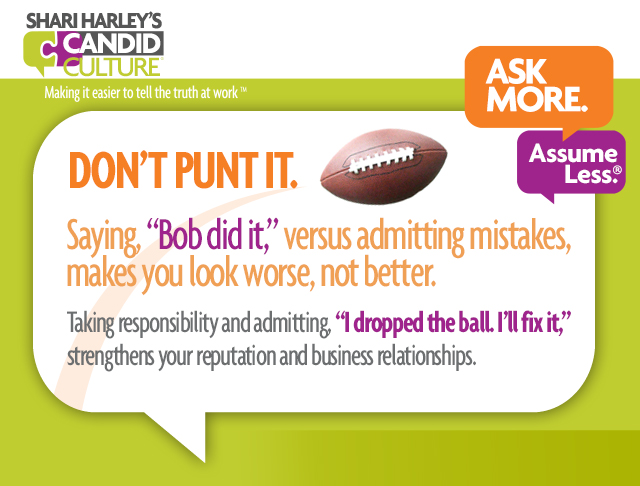
I made a mistake at work. Now what?
When you make a mistake say something like:
“I dropped the ball on that. I apologize. I’ll fix it and let you know when it’s been handled.”
Or, “Thank you for the feedback. This clearly didn’t go as planned. I’ll make those changes and let you know when they’re done.”
Also, let people know the steps you’ll take to avoid similar challenges in the future.
You could say something like:
“Thanks for letting me know that our process is causing your department challenges. We certainly want the process to be smooth. My team will fix this month’s report, so your team doesn’t have to invest more time. We’ll update the process for next month and walk you through the changes before the report is due.”
Don’t provide a bunch of reasons for breakdowns. No one cares. Telling people why something occurred can sound like excuse management. People just want to know things will be made right.
Asking for feedback, taking responsibility, and telling people how you will correct errors may not be your natural or first reaction. The more you can train yourself to do these things, the easier you will be to work with and the better your reputation and business relationships will be.

Click here to download free questions to find out what your coworkers and internal and external customers are satisfied with about your performance and what they wish you would do differently.
 Coming to work in costume on Halloween? Whatever you wear to work is likely to be captured by someone’s phone and shared . . . widely.
Coming to work in costume on Halloween? Whatever you wear to work is likely to be captured by someone’s phone and shared . . . widely.
None of these are work appropriate Halloween costumes:
- Your boss
- Your boss’s spouse
- An employee who is “regrettably” no longer with the organization
- Whatever fit ten years ago
Sometimes people forget that work parties are still work and work appropriate Halloween costumes should be worn.
This reminds me of a participant I had in a public speaking class several years ago. While doing a presentation, in class, he told a story about being ten years old and playing outside in his neighborhood when he realized he needed to go to the bathroom. He raced home, but didn’t make it. He ended up going to the bathroom outside, next to his house. After that class, every time I saw the guy in the hallway at work, I had the image of him pooping next to his house and years later the image remains with me.
Telling that story was a bad call. It created a long-lasting impression I doubt he wanted his co-workers to have.
long-lasting impression I doubt he wanted his co-workers to have.
Impressions are made more quickly than they are forgotten. Have fun on Halloween, just not too much fun. If you wouldn’t want to see a photo of you in costume hanging in your organization’s lobby or on your website, don’t wear it to work.
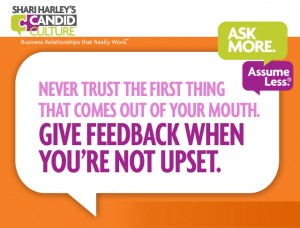 We’ve all received work from another person that wasn’t what we were expecting, hit reply, and told the other person what we thought. Then we dealt with the consequences.
We’ve all received work from another person that wasn’t what we were expecting, hit reply, and told the other person what we thought. Then we dealt with the consequences.
A few tips for giving feedback to get more of what you want and less of what you don’t:
Don’t give feedback via email. Ever. You can’t manage your tone or see the person’s reaction.
Practice the 24-hour rule and the one week guideline. Wait until you’re not upset to give feedback, but don’t wait longer than a week.
It’s almost impossible to give feedback without putting the other person on the defensive. Becoming defensive when receiving feedback is normal and natural. It’s a way to protect ourselves when we feel attacked.
When people are defensive, it’s hard to listen and respond. The less defensive the other person becomes, the easier it is to communicate with that person. People will be less defensive if you give feedback when you’re calm and choose your words carefully.
Communicate in a way that the relationship needs versus what you need in the moment.
When we give feedback when we’re upset, we’re really communicating for us, not for the other person. I didn’t get what I want. I’m upset. And I’m going to tell you about it. Then the other person gets upset and now, in addition to you not getting what you wanted in the first place, you have to do damage control.
Communicating in a way the relationship needs means choosing the timing, words and method of communication that is likely to produce the result you want – the other person being able to hear you, while becoming minimally defensive, and taking action. Giving feedback when you’re upset, especially via email, will not produce the result you want. You’ll only damage your relationship.
Being a good communicator and maintaining good business relationships requires patience and self discipline. This is something I work on ALL the time. Last week I sent one of my vendors feedback via email, when I was upset, and spent two days trying to recover. I sent a minor email with critique, he felt attacked, and I damaged our relationship.
It doesn’t take much to raise someone’s defensiveness to the point that you have to do damage control.
Wait to give feedback until you’re not upset. Don’t send an email. Pick up the phone or walk to the person’s desk. Deliver the feedback in a way the other person can hear you. Be ready for him to become defensive. It’s human to become defensive. You can’t eliminate defensiveness, but how you deliver feedback can greatly reduce it. And you’ll get more of what you want and less of what you don’t.
Read How to Say Anything to Anyone and get the words to have even the toughest conversations.

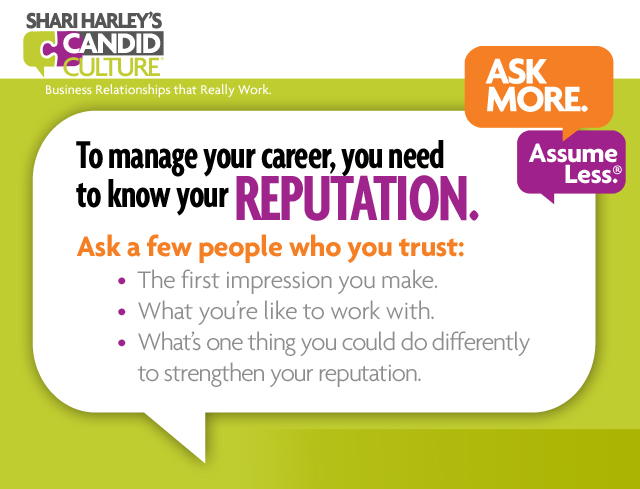 Unfortunately you probably already know that people have a tendency to talk about you, not to you. It’s human nature. Sometimes it’s gossip. Other times senior leaders talk about your future with the organization. If you want to advance your career, you need to know what the people whose opinions you care about say about you when you’re not there.
Unfortunately you probably already know that people have a tendency to talk about you, not to you. It’s human nature. Sometimes it’s gossip. Other times senior leaders talk about your future with the organization. If you want to advance your career, you need to know what the people whose opinions you care about say about you when you’re not there.
Unfortunately most people get very little feedback at work. If today was the day of your performance appraisal and I asked how your boss and whoever else provides input on your review would rate you, you probably don’t know. This lack of knowledge prevents you from advancing your career.
Not knowing someone’s opinion doesn’t mean you’re not subject to it. Akin to getting a speeding ticket when you didn’t know you were speeding. The cop doesn’t care. He adds four points to your driving record, despite that you didn’t know the speed limit.
You may work for a manager who gives feedback. You may not. It doesn’t matter. There are people in your life who will tell you the truth (as they see it), if you ask.
I recommend assembling a core group of people who you count on to tell you the truth. These are the people who know you well and have your back. They can be friends, family members, past coworkers, customers, or managers.
You might wonder, “What can my mom or friends from high school or college tell me about how I behave at work?” The answer–a lot.
We don’t become different people when we arrive at work. We are who we are. If you’re often late, break commitments, or wear clothing that’s not your friend, you do those things at home and at work. Likewise, if you have great attention to detail, never break commitments, and always look great (in public), you friends and family know.
Identify a few people, personal and/or professional, who care about you and will tell you the truth.
Tell these folks you want to eliminate your blind spots. Ask them for specific feedback, and promise that no matter what they say and how hard it is to hear, you will say “thank you.” Then be sure to manage yourself. It’s normal to become defensive when we get constructive feedback. But every time we become defensive, we train people it’s not safe to tell us the truth. If you want people to give you feedback, more than once, make it easy to tell you the truth.
You may be thinking that asking for feedback is unrealistic. People won’t be honest. And you can’t take it.
The people who really care about you will be honest, and you can take it. You’ll be fine. In fact you’ll be better off than before you had the conversations. You might hear things that pleasantly surprise you. And the things you don’t like? Just because no one talked to you about them before you asked, doesn’t mean those behaviors didn’t impact you. Now you can do something about them.
Get out of the dark and into control. Discover your reputation and advance your career.
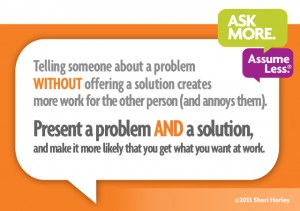 Despite what you may think, your manager has enough to do. So when you drop a problem at her door, she finds it annoying. Rather than just alerting your manager and the leaders in your organization to the things that need to be fixed, go one step further, and be a change agent by offering a solution yourself.
Despite what you may think, your manager has enough to do. So when you drop a problem at her door, she finds it annoying. Rather than just alerting your manager and the leaders in your organization to the things that need to be fixed, go one step further, and be a change agent by offering a solution yourself.
It’s fine to raise challenges. It’s better to raise challenges you’re willing to do something about. If you think two departments don’t talk to each other, bring them together. If you think a process is inefficient, propose a different way to get the work done. If you’re dissatisfied with software you’re using, offer to source three potential vendors and set up a demo. You’re doing the legwork and asking for a small investment of time.
When we ask for something at work, it often requires time, money, or both. Thus when an employee asks for something, it’s easier for a manager to say no than it is to say yes. “No” requires no work and no financial outlay. A “yes” may require both.
You make it easy to say yes to your requests when you’re acting as a change agent:
- Propose a solution to a problem.
- Offer to do the work to solve the problem.
- Ask for small things that are easy to approve.
If you’re overwhelmed and want to hire an additional person, but your boss isn’t convinced you need the headcount, ask for a temp for a finite number of hours. It’s much easier for a manager to say yes to a small and known investment amount than to the long-term commitment of hiring someone new. The point is to ask for something that is easy for your manager to approve.
The word “pilot” is your friend. If you want to make a major change, pilot a scaled down version of your proposed solution in one or two locations, rather than in your organization’s 10 locations. Again, asking for something small makes it more likely that you’ll be told yes.
The bottom line is to be part of the solution – as trite and overused as that phrase is. Don’t be the person who says, “That’s broken” without also saying, “and here’s how we can fix it. Can I give it a try?”
Vague is useless. Being vague is actually worse than useless. Being vague instills doubt in the people around you and reduces your credibility.
When a customer service agent answers my questions with words like, “That sounds right, I think so, or that should work,” I hang up and call back, hoping to get someone who can give me an affirmative answer. People do this to you too, they just don’t tell you about it.
Watch your language. If the answer is yes, say “Yes.” If the answer is no, say “No.” “I think so,” says neither yes nor no. Saying, “I think so” tells people you don’t really know.
A few phrases to avoid and what to say instead:
Avoid: “That should be done by Friday.”
Instead, be specific and give a final date. “That will be complete by Friday. If I can’t get it done by Friday, I’ll call you to let you know by 5:00 pm on Thursday.”
Avoid: “Sounds right.”
Instead, be specific and say, “That’s correct.”
Avoid: “We should be able to do that.”
Instead, be specific and say, “We can do that.”
Avoid: “I guess.”
Instead, be specific and say, “Yes” or “No.”
When I teach feedback training, the biggest thing training participants struggle with is specificity. “You’re difficult to work with.” “Your clothing is inappropriate.” “I just find you to be negative.” “You did a good job on that.” “It’s a pleasure to have you on the team.” All of this is vague and thus unhelpful to the feedback recipient. And the same is true when answering questions and making promises.
Tell people exactly what to expect. Be specific. Even if they don’t like your answer, they’ll be happy to have a clear answer.
I’ve always thought it was weird to sit next to someone on a plane and not say hello. I don’t mean a long chat, “Where are you going? Do you live there? What do you do for work,” merely a hello. Or to pass someone on the street or at the gym who pretends not to see me. It’s downright weird. And it’s even worse at work.
Passing someone in the hallway at work who you may or may not know and not saying hello can be off putting to many people. Admittedly, some people don’t care. But more do.
Many of the people you work with are affronted if you pass them in the hallway and don’t smile and/or say hello. They’ll never tell you they’re put off by the lack of social graces, they’ll just make decisions and assume they’re right. They’ll tell themselves, “We sit in multiple meetings together, and that guy doesn’t even know who I am.” Or, “I’ve walked past this woman every day for five years and it’s like she’s never seen me before.” Or, “Bob never says hello when he sees me in the hallway. I wonder why he doesn’t like me?”
Chances are you’re not thinking any of these things about the people you work with. You’re busy and focused on other things, and your mind is not on making small talk when you pass people in the hallway. But know that not saying hello can have an impact on the people around you and your corporate culture.
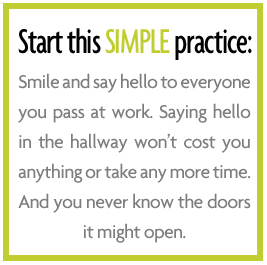 Start this simple practice: Smile and say hello to everyone you pass at work. Saying hello in the hallway won’t cost you anything or take any more time. And you never know the doors it might open. Maybe the person in accounts payable who’s been kicking back your expense reports will cut you a reimbursement check even when you fill out the wrong form. Or maybe IT will come to your desk first versus eighth when your laptop decides it’s taking a vacation day.
Start this simple practice: Smile and say hello to everyone you pass at work. Saying hello in the hallway won’t cost you anything or take any more time. And you never know the doors it might open. Maybe the person in accounts payable who’s been kicking back your expense reports will cut you a reimbursement check even when you fill out the wrong form. Or maybe IT will come to your desk first versus eighth when your laptop decides it’s taking a vacation day.

Sometimes we ask people for feedback when we don’t really want the answer.
• Do I look fat in these pants?
• Do you think ______ (insert name of person you’re dating) is right for me?
• Was I rude to ______ (insert name of person who annoyed you)?
• Did I do a good job on ______ (insert project)?
Don’t ask questions you don’t want answered. If you do ask, don’t get defensive when you get an answer you don’t like.
If you ask for feedback, people may just give it to you. When they do, make it easy on them. So they’re willing to do it again. Don’t get defensive!
Every time we get defensive, we train people not to tell us the truth. And it doesn’t take many instances of dealing with our defensiveness before people learn that telling the truth (as they see it) is just too hard. So they stop. And we continue dating the wrong people, while wearing the wrong pants.
The right answer to feedback is always “thank you”, regardless of what you think of the feedback. It could sound something like, “Wow, that’s really disappointing. Thanks for telling me.”
If you want someone’s opinion, ask for it. And accept whatever they say graciously, regardless of what you actually think. And if you don’t want honest feedback or can’t take it without saying “thank you”, don’t ask.
A few months ago, a participant in one of my programs asked me if introverted leaders are at a disadvantage in the workplace? The answer is a resounding YES!
Her question reminded me of a conversation I had with a manufacturing plant manager years ago. He was frustrated with his safety manager who was quiet and didn’t speak up in meetings. The plant manager was gregarious and hired people who matched his style. Everyone on his leadership team, excluding the safety manager, was outspoken. Their team meetings were boisterous events in which everyone talked, excluding the safety manager. The plant manager felt that if the safety manager didn’t start speaking up in public settings, his contribution and career would be limited.
Often the only exposure most employees get to their organization’s senior leaders is in meetings. And introverts often don’t speak up in meetings. Senior leaders often decide that because they’ve never heard ______ (insert name) speak, s/he must have nothing to say. This isn’t true, of course. And it isn’t fair. But it is how it is.
Extroverts think as they’re speaking, hence the expression think out loud. Introverts typically think through their thoughts before they share them.
Introverts have a lot to say. And because they process before they speak, what they have to say can be more thoughtful than what extroverts say. But the senior people in your organization are busy. While they may want to get to know each employee personally, they simply can’t. Busy schedules and limited exposure force senior people to form quick and sometimes inaccurate impressions and judgments about employees.
Introverted leaders need to find ways to make their opinions and contributions known. And they can do that in a variety of ways that are aligned with their personal styles. None of us are going to, nor should we, become a different person to fit in at work. We can adapt and adopt different behaviors, but we are who we are. And if we try to be someone we’re not, that façade will eventually become unbearable, and we’ll quit.
My advice is to be yourself, and find ways to share your contributions in a way that resonates with your personal style.
Here are a few suggestions for introverted leaders:
- If you’re uncomfortable speaking up in meetings, email your ideas to senior leaders, where appropriate.
- Ask for a one-on-one meeting with your boss’s boss. Ask your boss to support the meeting and tell him/her that you know you’re quiet and you want to increase your exposure in the organization. Don’t go around your boss. This will never bode well. Simply demonstrate self awareness, commitment to your career and to the organization, and ask for your boss’s support. Prepare an agenda for the meeting that includes potential solutions to organizational challenges.
- Make sure you are meeting with your direct supervisor at least once a month. During the meetings share your most recent accomplishments. These meetings are an appropriate place to self promote. If you don’t tell your boss all the great things you’re doing, s/he may not know. And if s/he doesn’t know what you’re doing, she definitely can’t share your accomplishments with others. If your boss doesn’t schedule one-on-one meetings, ask for the meetings. That request can sound like, “I know how busy you are. I want to be sure you know what I’m working on and that I get your input on projects. Can we meet once a month to discuss?” There are more examples of how to get more face time with and feedback from your boss in chapters five and nine of my new book How to Say Anything to Anyone.
- Push yourself. If you’re asked to present at a meeting, do it, even if you’re uncomfortable. Make notes and practice out loud until you’re more comfortable.
- Ask for exposure to different types of work and departments in the organization. Cross train where appropriate. Offer to help on projects outside of your role. Meet people in other departments. Get to know more about what others do and how you can add value to their department and projects. This will demonstrate your commitment to your career and to the company, and will give you exposure to different people and parts of your organization.
In other words, push yourself. Your job will feel richer and you’ll be positioned to do more.
Unless you work in a cave, you know that people have a tendency to talk about you, not to you.
Often employees have no idea where they stand performance-wise, in their organization, because for the most part, people don’t tell them. This lack of information leaves employees in the dark, not knowing what to do more, better, or differently.

People we interact with peripherally, if at all, talk about us to the powers that be in our organizations. And we have no idea. We often don’t know what is said about us, by whom, and to whom.

I learned this lesson several years ago, before starting Candid Culture.The most senior woman at the company where I was working, the President of a division, told my boss she’d like to mentor me. Doesn’t that sound nice? The funny thing is, beyond saying hello to me in the hallway, I didn’t even think she knew who I was. We never worked together, and our paths rarely crossed.
During our first meeting, the first thing my new mentor said to me was, “I think you’re checked out. So get in or get out. But decide.” Holy _____!!!! I was shocked. She was right, of course. I was already planning to quit and start a business. But I didn’t know that it showed.
I’m not telling you this as a lesson about how to manage your professional reputation, even when you may be looking for your next opportunity. Not that that isn’t important. It is. It’s just not my point here. The reason I’m telling you is this: My new mentor was the most senior woman at the company. She reported to the CEO. My boss was her peer. She told me she thought I was checked out. Do we think she kept that observation to herself. It’s doubtful. I’m SURE it came up in a leadership meeting with all of her peers –the C-Suite.
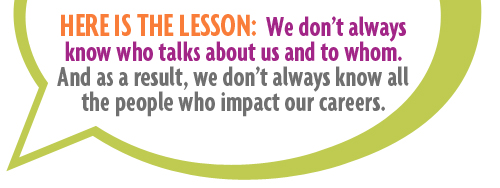
If you don’t know who whispers in your boss’s and his/her boss’s ear about you, find out. And the person to ask is your boss. S/he knows and will most likely tell you, if you ask.
Here are a few questions you can ask your boss to help manage your professional reputation:
- What skills do I have that the organization values most?
- What contributions have I made that the organization values most?
- What mistakes have I made from which I need to recover?
- Who in the organization should I have a good relationship with?
- Who/what departments should I work closely with?
- Who impacts my reputation and the opportunities I have?
Yes, you can ask these questions. No, you won’t die. Yes, your boss will answer them. No s/he won’t be annoyed. I assure you, your boss has had few if any employees who asked him/her these questions. It will be a refreshing change.
Just remember, the right answer to feedback is “thank you,” regardless of what you think in your head. The easier it is to give you feedback, the more you’ll get.
Read more about how to manage your professional reputation and get more feedback in my new book.




 Coming to work in costume on Halloween? Whatever you wear to work is likely to be captured by someone’s phone and shared . . . widely.
Coming to work in costume on Halloween? Whatever you wear to work is likely to be captured by someone’s phone and shared . . . widely. long-lasting impression I doubt he wanted his co-workers to have.
long-lasting impression I doubt he wanted his co-workers to have. We’ve all received work from another person that wasn’t what we were expecting, hit reply, and told the other person what we thought. Then we dealt with the consequences.
We’ve all received work from another person that wasn’t what we were expecting, hit reply, and told the other person what we thought. Then we dealt with the consequences.
 Unfortunately you probably already know that people have a tendency to talk about you, not to you. It’s human nature. Sometimes it’s gossip. Other times senior leaders talk about your future with the organization. If you want to
Unfortunately you probably already know that people have a tendency to talk about you, not to you. It’s human nature. Sometimes it’s gossip. Other times senior leaders talk about your future with the organization. If you want to  Despite what you may think, your manager has enough to do. So when you drop a problem at her door, she finds it annoying. Rather than just alerting your manager and the leaders in your organization to the things that need to be fixed, go one step further, and be a change agent by offering a solution yourself.
Despite what you may think, your manager has enough to do. So when you drop a problem at her door, she finds it annoying. Rather than just alerting your manager and the leaders in your organization to the things that need to be fixed, go one step further, and be a change agent by offering a solution yourself. Start this simple practice: Smile and say hello to everyone you pass at work. Saying hello in the hallway won’t cost you anything or take any more time. And you never know the doors it might open. Maybe the person in accounts payable who’s been kicking back your expense reports will cut you a reimbursement check even when you fill out the wrong form. Or maybe IT will come to your desk first versus eighth when your laptop decides it’s taking a vacation day.
Start this simple practice: Smile and say hello to everyone you pass at work. Saying hello in the hallway won’t cost you anything or take any more time. And you never know the doors it might open. Maybe the person in accounts payable who’s been kicking back your expense reports will cut you a reimbursement check even when you fill out the wrong form. Or maybe IT will come to your desk first versus eighth when your laptop decides it’s taking a vacation day.



